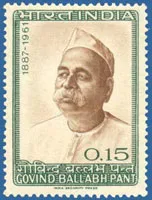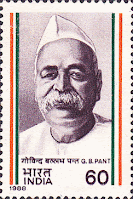Stamp issued in 1965
Stamp issued in 1988
Pandit Govind Ballabh Pant (10 September 1887 – 7 March 1961) was an Indian freedom fighter and one of the architects of modern India. Alongside Mahatma Gandhi, Jawaharlal Nehru and Vallabh Bhai Patel, Pant was a key figure in the movement for India's Independence and later a pivotal figure in the Indian Government. He was one of the foremost political leaders of Uttar Pradesh (then known as United Provinces) and a key player in the movement to establish Hindi as the official language of India.
Major Works
- As a young lawyer, Pandit Pant successfully campaigned against the British Raj in 1914, by challenging a law that required locals, known as ‘coolie beggars’ to carry the luggage of British officers for free.
- He played a significant role in the Indian freedom movement He was an active participant in both the Non-Cooperation Movement and the Civil Disobedience Movement.
- After India’s independence, as Chief Minister of Uttar Pradesh, he was successful in stabilizing the economic condition of the state. He abolished the zamindari system, made monogamy compulsory for Hindu men and conferred Hindu women the rights to divorce and inherit ancestral property.
- As Home Minister, he was successful in re-organizing the States along linguistic lines. He also established Hindi as an official language of the central government and a few states.
Awards & Achievements
- In 1957, he was awarded India’s highest civilian honor, the Bharat Ratna, for his selfless service to the nation.

